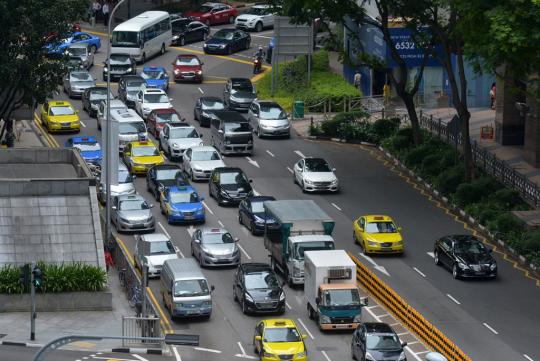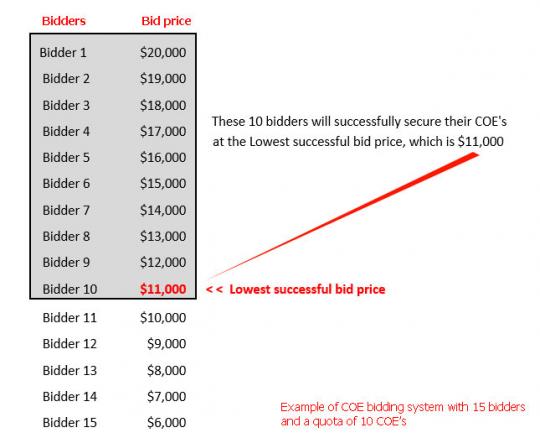Understanding Singapore's COE system
Understanding Singapore's COE system

Certificates of Entitlement (COEs) give Singaporeans the right to own a vehicle. COEs are integral to the Vehicle Quota System (VQS), a landmark scheme implemented to regulate the growth of vehicle population in Singapore which, due to land space, is unsurprisingly among the densest in the world.
The VQS determines the exact number of vehicles allowed on the road. Other measures to curb vehicle growth like raising taxes and fees do not have the advantage of knowing the exact increase needed to get a desired level. Under the VQS, vehicle growth could be pegged at 3% every year with the expansion of roads and highways taken into consideration. The VQS was implemented in 1 May 1990 and the first bidding under the system started on 2 April 1990. Public buses, school buses and emergency vehicles are exempted from this scheme.
In the 80’s, as Singapore developed and Singaporeans grew affluent, car ownership became prevalent. Thus, there was a desperate need to manage the rapid growth in the number of vehicles in relation to Singapore's road capacity. Between 1975 and 1990, the growth rate of the car population was as high as 12% per annum before the recession of 1985, which triggered the government to undertake a combination of usage and ownership measures, including parking charges and the Area Licensing Scheme (or ALS, and later the Electronic Road Pricing or ERP) while steps to curb ownership comprise vehicle taxes (such as the Additional Registration Fee or ARF) and excise duty. To further control the growth of vehicle population the Vehicle Quota System (VQS) was introduced. The VQS was the key proposal of the Parliamentary Select Committee on Land Transport, chaired by Professor Hong Hai, which released its report in January 1990.
The VQS was then implemented on 1st May 1990 and the first bidding started on 2 April 1990. Under this system, a Certificate of Entitlement (COE) had to be bidded for that category of vehicle. A certain number of COEs would be released every month for bidding. Once successful and only when one owns a COE, which is valid for 10 years, that registration of the vehicle could take effect.
Central to the VQS is the outcome of capping the growth rate of the vehicle population at 3% per annum, compared with an average of 6.8% per annum in the three years prior to the implementation of the VQS. It was reported that without the VQS, the growth rate would have spiralled over the last 10 years and traffic would have grounded to a halt, adversely affecting Singapore's economic development and quality of life(None of us would want that).
VQS started as a Closed Bidding System where bidders would not know how much others had bid. The quota premium payable was the lowest successful bid. Those who had bid this amount or more would be entitled to a COE at the lowest successful bid price. But due to lack of transparency, it led to high fluctuations in the quota premium. In June 1999, the COE Open Bidding system was designed and tested, and was carried out in June 2001 in tandem with the closed bidding exercise. Every month, half of the quota was allocated for open bidding and the other half for closed bidding. In April 2002, the COE Open Bidding System totally replaced the Closed Bidding System. With open bidding, bidders could monitor the current COE prices and revise their own bid.
In 1998, a Government Parliamentary Committee was appointed to do a review of the VQS nine years after its implementation. The Committee presented its findings to Minister for Communications, Mr Mah Bow Tan, on 2 March 1999. The Committee affirmed the effectiveness of the VQS as one of the key pillars in Singapore's traffic management strategies and recommended that the scheme be retained. The growth rate of 3% per annum was fixed until 2005 and thereafter constantly reviewed.
So with all that being said, due to its effectiveness, it is almost certain that the COE system may be here to stay for good :)








8 Comments
Recommended Comments
Create an account or sign in to comment
You need to be a member in order to leave a comment
Create an account
Sign up for a new account in our community. It's easy!
Register a new accountSign in
Already have an account? Sign in here.
Sign In Now